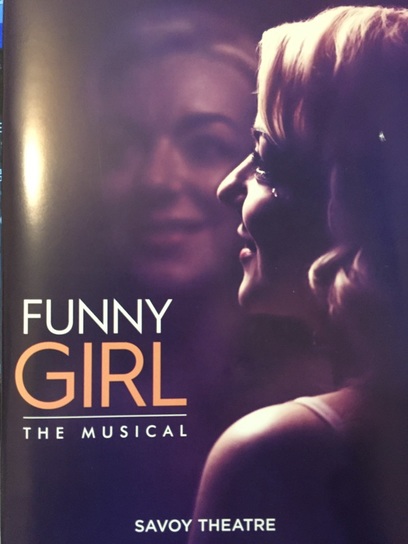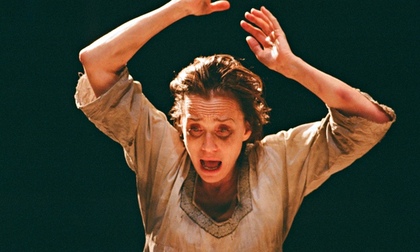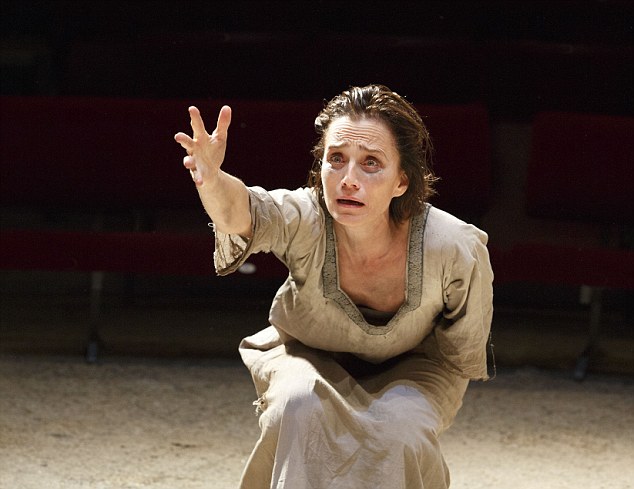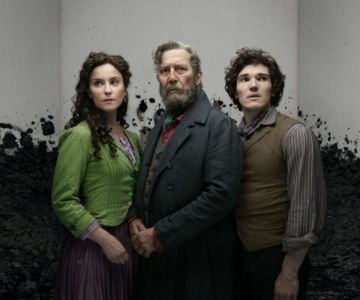 Vegan Guide to Michelin Restaurants: The Clove Club, London, UKby Randi / August 22, 2016
Vegan Guide to Michelin Restaurants: The Clove Club, London, UKby Randi / August 22, 2016Okay, maybe you’d like to know what these messages are. Well, “Funny Girl” is a very fictionalized tale of Fanny Brice, the legendary actress from the ’20s and ‘30s known for the Ziegfeld Follies and the song “My Man” (not in the musical). It debuted on Broadway in 1964 with the score by Jules Styne and Bob Merrill and book by Isobel Lennart. I know you’re thinking ‘how can it be so anti-feminist if the book was written by a woman’ but hello Palin & Fiorina & Bachmann and the rest of those self-hating toxic beach diapers. (Also she was a COMMIEEEEEEEE!) So we see Fanny, this totally goofy Jewish girl from Brooklyn, trying to break into show business but everyone in her life – her friends, peers, family, and all the old yentas from the neighborhood – keep quoting my girl Shug Avery and telling her “damn you sho is ugly!” and so no one takes her dreams or her talent seriously for a while. Um, side note, I know I’m newer to the earth and wasn’t around, but I’m pretty sure the characterization of Fanny as overwhelmingly goofy physically, and as waddling like a duck/unable to look like a human when she walks because lol so chub, was a decision of the director and production and actors, so ick. I know Real Fanny was a comedian and made some amazingly silly faces as part of that but I don’t think her face was stuck in sideways baby duck face during every moment of her life.
Anyway, Fanny tells the people of horseville that she’s destined for stardom because she is the greatest star of all, in a song called “I Am the Greatest Star of All”. It’s hard to buy it when we haven’t seen her really do anything yet and it isn’t being sung by the greatest singer ever, as it was when Barbra sang it, so just gotta trust her on this one. She gets into vaudeville and her career takes off because she’s so outrageous and funny and untraditional, and she joins the esteemed Ziegfeld Follies, where she soon meets Nicky Arnstein, a suave tall person in a nice suit who is also a gambler and really a shit. (He’s played pretty perfectly by Darius Campbell, who really reminded me of Andy Garcia in “Ocean’s Eleven” #thatmonotonetho) Because he is so tall and suave and she is so disgusting and unlovable, Fanny falls for Nicky hard and is just counting her lucky stars every few seconds that he likes her back. (They sing “People” when they first meet, which I was excited for but it was kind of underwhelming.) No one can believe that anyone could ever love someone as repulsive as Fanny, and all the people in her life pretty much say that to her face, and Fanny can’t believe it either, so she resolves to marry Nicky as fast as she can to prove that she is worth something as a woman, because her stellar career and personal success means bupkis mit kaduchas if she can’t get a man. When she leaves a tour to find him and marry him, she sings to pretty much a random train conductor “Don’t Rain On My Parade”, which in my version she sings to Nicky when she decides not to marry him so she can focus on her career and finding someone worthy of her.
Nicky’s shifty business deals and gambles go up and down, and Fanny supports him through everything. This makes up the bulk of Act II, interspersed with some sort of painful scenes from the Follies and tooooo many numbers with the mother and the yentas and Fanny’s friend Eddie who is in love with her and is soooo the token ‘nice guy’ who thinks that just because he isn’t an outright asshat he is entitled to the thing he’s being sort of ‘nice’ to. I did appreciate “Sadie Sadie Married Lady” if only because I’m currently doing a “Gilmore Girls” rewatch and that’s the name of the episode where Lorelai gets engaged (the first time) and Sookie sings a bit of it (side note, Sheridan looked just like Melissa McCarthy at points! So that was a plus), but in truth it is as horrifying as the rest of the show’s messages. The whole point is how lucky an unattractive woman (obviously she is not really unattractive, not that that matters, but this is how it’s presented) is to find a man, any man, who cares if he’s a shit, and she better lock him down before he realizes that she isn’t a model. Then, when Fanny reaches the heights of success and makes a lot of money, she shouldn’t be proud, she should be ashamed because it makes her dickless husband struggle with being dickless, and her ability to pay for everything he could ever want makes Nicky feel like she’s choking him? Nicky gets sent to jail because of shady business deals and embezzlement, but every single person in the whole show blames Fanny for his crimes, because having a successful wife forced him to commit crimes, pretty much. Nicky leaves her when he gets out of jail because he can’t be suffocated by a wife who is happy to support him, and Fanny and her mother don’t fight the accuracy of his statements. I mean. No. I get that this is old but come the f on Bridget. The moral of this show was literally telling women not to do anything with their lives that could lead to success because it might make your raisin-balled husband feel the sads about his raisins.
When these types of messages are put forward with no commentary, it’s problematic because many people have zero critical reasoning skills. People who are these intellectual blank slates will accept them and swallow them without a second thought and just nod and say okay this is okay, sure sure. Then people who are already terrible people or at least moonlight as terrible people will hear this overt support for outdated, dangerous, and harmful views and they’ll think oh okay, I can make this my day job now. It’s kind of like why I despise “SVU” for normalizing violence against women by showing so goddamn much of it. Even though they are showing it as ‘bad’ and perpetrators get ‘punished’ (maybe/sometimes/never), it still normalizes the occurrence and lets people continue to accept it as just how the world works, without any urging to change that foundational way of operating. Likewise, by having most of the drama rely on accepted forms of misogyny, “Funny Girl” perpetuates this misogyny as just how the world works and that we should follow their lead and not challenge that. I mean she sort of sings a reprise of “Don’t Rain on My Parade” at the end through her tears about Dicky Nicky leaving her but 30 seconds of ‘maybe one day I won’t care about him’ doesn’t make up for 2 and 1/2 hours of wimmins better stay in the kitchen.
What really bothers me is, well, several things. Fanny Brice was a real person, with an incredibly interesting life that is still remembered and revered by performers today. This main depiction of her is a great disservice to her memory, and that’s unbelievably sad and unfair. To say the creators took liberties with the facts is putting it lightly. “Funny Girl” is highly, highly fictionalized, and most of the horrible crap I’ve discussed is part of what was fictionalized. That means the creators of the original Broadway show implemented unnecessary, added misogyny. They thought ‘let’s make a show about this legend in show business, but because she’s a woman, let’s just show part of her success but then make most of the show about how she was so ugly that she thought she could never find a man, and then she meets Nicky and can’t believe her luck that a handsome man wants to be with her because come on all men want is someone pretty so she really is lucky but then she ruins everything because she makes money and gives him everything he wants and he doesn’t have much success and she shouldn’t support their family and be successful because that’s so mean and he feels totally emasculated which is the worst crime on earth and so she drives him into criminal behavior and he goes to jail and it’s all her fault obviously and everyone even her mother and even herself believe that Fanny is to blame for a totally separate fully functioning human being’s bad decisions and like women should just stay at home amiright.’ First of all, fuck all of that. Second of all, Fanny Brice, the real one, was married before she married Nicky Armstein. She was married. Yet the main action of the first act of the musical is every single person in her life absolutely kvelling because a man might actually not vomit at the sight of her! Praise Moses! Why, creators, did that strike you as the necessary change to make when rewriting Brice’s life for the stage? Did it just seem more realistic to you? More realistic than reality? To say ‘well she was no looker so instead of showing how she was so awesome and talented that it didn’t matter or that it doesn’t matter, let’s open with a number about how all actresses just need to be hot, and then make the whole show about how desperate she is for a man to notice her and how lucky she is that a good one does, but then she ruins him and makes him a bad one with her success, he wasn’t bad at the start it was her evil wimmin doings.’ I cannot wrap my brain about the thought process that takes an interesting life and makes it just another bullshit story about how desperate and awful women are.
Next, you know what else was fictionalized? Like everything about their relationship. Nicky was in jail BEFORE they got married – and he was actually married at the time to another woman. So he wasn’t this perfect specimen of a unicorn sent to make her less pathetic or anything; he was the pathetic convicted criminal cheating on his wife from the very start. Nicky happily took Fanny’s money even before they were married. His later gang activities didn’t lead him to turn himself in, as the musical says, as a result of his emasculation by not being able to support his family. No, he continued relying on Fanny’s money in order to fight the charges against him for years. That doesn’t not sound like someone who has a problem using his wife’s money, but I guess to the creators it sounded like someone who should have felt emasculated and ruined because he was letting someone without a penis pay for things.
Almost as importantly, there is no evidence I could find of Brice performing a hilarious wartime number in the Follies as a German Private Schvartz as she does in the musical, which I assume is what “Springtime for Hitler” was based on. It was probably the most painful song in a musical I’ve ever seen. Jfc. Why on earth was this part of “Funny Girl”? DO NOT UNDERSTAND.
God it’s hard reliving this. It’s really sad too because who doesn’t remember loving the movie with Barbra, and who doesn’t love all the famous songs? But at least as shown in this production – which as far as I can find is pretty true to the original musical – it’s disturbing and hugely problematic, especially as society seems to be entering a downturn in progressive views. And it’s not a bad production, the bones of it anyway. The costumes were fine, the lighting was fine, the acting was good. Actually, I remember feeling cheated by the simple choreography. But the story, my god the story. But the audiences are eating this shit up, which really upsets me. Do they just not care about the messages? Or are they in agreement? Do they not even realize what’s being said? Sheridan got many ‘bravos’ and a standing ovation, which a) should be brava and b) I think were for her personal life more than for her performance. She is a good actress, but this was not the role. I know I said some big musical roles don’t necessarily need a great singer if the acting is strong enough, but this show isn’t strong enough to do without a baller voice. But I was happy to see Sheridan after the summer she had. She is well known in the tabloids here, sadly, for fighting with the producers about needing time off when her father got very sick. Since producers only care about money, they allegedly didn’t give her the time she wanted or needed and she quickly unraveled mentally – including onstage. Some lucky ticket holders in the beginning of the summer got to see her perform drunk. Which, since British people are drunk all the damn time, maybe no one really noticed. Anyway, after that she took a few months off and her understudy Natasha Barnes took over. Apparently Natasha was amazing, with a much more appropriate voice for the role. I’m really happy that Sheridan seems to be okay now and getting what she needs, and none of my more substantial problems with the show have anything to do with her.
I honestly think that British people are liking this show because they are just laughing at the name Fanny (fanny is actually slang for vagina here, not kidding) and so they aren’t really paying attention to the story because every time someone says Fanny they cover their mouths and mutter ‘oh tee hee, a proper tee hee’. Really the best part of this show was a blue velvet dinner jacket that Nicky wears at one point.
* * *
AUDIENCE
I’m flabbergasted that they weren’t all horrified. I’m also still bothered by the woman in front of me who brought her 7-year-old daughter. Not only was I scared that this child was learning from the terrible messages of this show, but they also talked the entire time – not just the girl turning to ask questions, which kids do, but the ADULT who is supposed to be the role model for how to behave in the theatre was also turning to the girl every 2 seconds I’m pretty sure to say ‘DID YOU SEE THAT? DID YOU HEAR THAT?’ jfc.
THEATRE
Um. The bars were selling bagels. That’s super offensive, right? No, they don’t usually sell bagels; yes, I think it’s because this is a ‘jewish show’ to them. I don’t know whether to be more offended by that decision or by the quality of British bagels. The programmes were beautiful though (see picture).
I do have a problem with the theatre owners and the producers, not just here but with all West End shows. The opposite of Broadway’s policy, the policy here is that refunds are not issued if a star above the title is out. That means all the people who bought tickets to see Sheridan over the summer while she was out could not get their money back, as they can on Broadway when the star is out. There is a lotttttt of argument about this policy lately, with people saying that introducing such a policy would be unfair to understudies if people would leave when they were announced. But, in practice on Broadway, few people actually do this; it’s the ones who came only to see the star that really take advantage of it, or someone who already has seen the understudy and was trying again to get the star. The real concern is just that the producers don’t want to lose money. But that’s bullshit. I fully support Bway’s policy and wish that they had it here, because when a star like Sheridan is above the title, producers hike up the prices. If they are charging more because of a name, and then the name is out, you should get your money back if you want it, period. If they don’t want to give you your money back in those situations, then they need to stop having celebrity price hikes.







